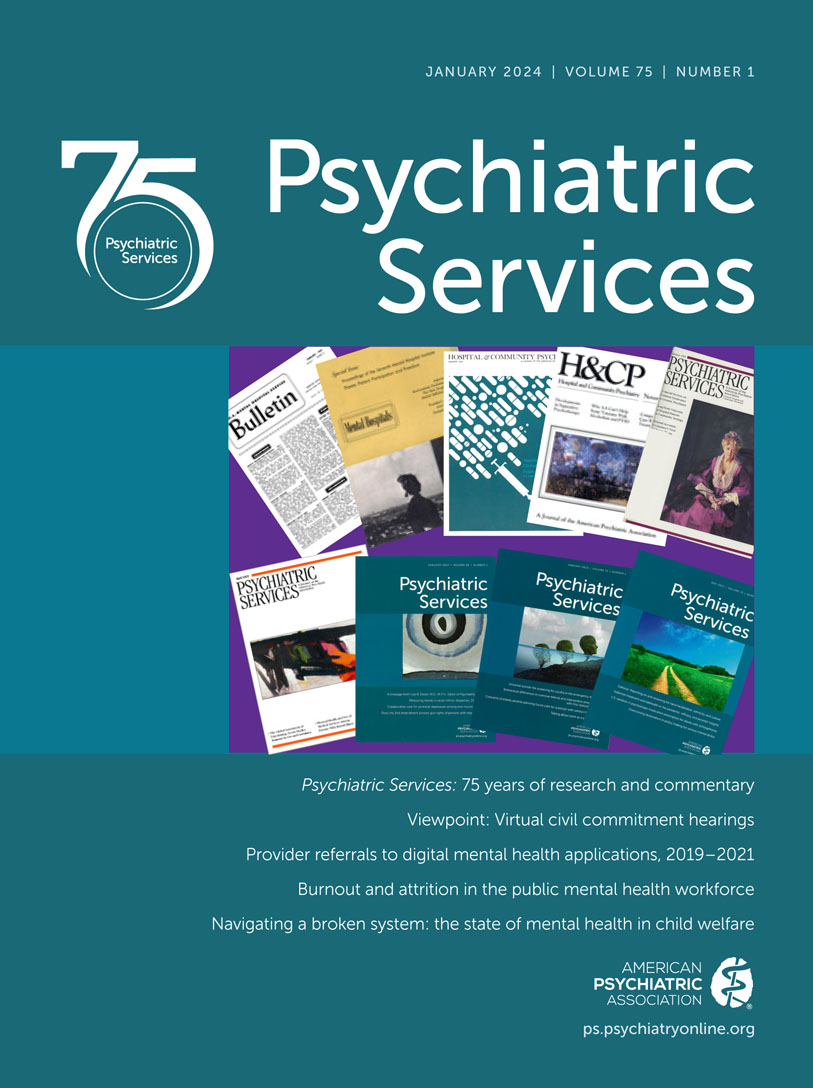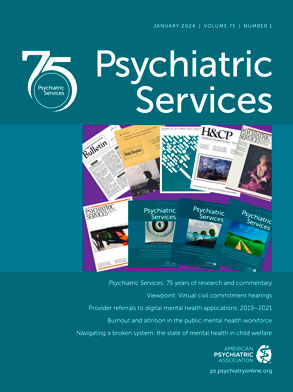Access to and continuity of care of mental health and psychosocial support in humanitarian crisis settings remain limited. Governments and humanitarian agencies offer internally displaced people (IDP) a range of services, including mental health and psychosocial support. Yet, most IDP with mental disorders do not receive needed care because of a scarcity of specialist providers both in the health system and in humanitarian agencies. A meta-analysis of 129 studies from 39 countries (
1) estimated that 22% of people affected by conflict had a current mental disorder, three times the global mean prevalence in the general population, as determined by the Global Burden of Diseases, Injuries, and Risk Factors Study 2016. The COVID-19 pandemic has exacerbated health disparities among IDP, increasing mental health needs in this already vulnerable population (
2).
Beginning in 2017, a local insurgency in the northern Mozambican province of Cabo Delgado has resulted in the migration of 674,000 IDP to Pemba, the provincial capital, and the neighboring Nampula Province. A rapid assessment conducted in Nampula Province identified distress as a serious problem for approximately 75% of IDP (
3). However, although care in the public health system in Mozambique is free and mental health services are available in district-level health care facilities, care coverage remains low, with just 457 mental health specialists serving 29 million people.
To address this mental health treatment gap, an integrated health system response to meet the needs of IDP is critical. Specifically, staffing can be extended by training nonspecialists, such as primary care providers (PCPs), to deliver evidence-based treatments (EBTs) and prescribe psychiatric medications. Mental health specialists, charged with training and supervising nonspecialists, can oversee complex cases to determine the need for referral to specialized mental health care settings.
Integration of stepped care, in which nonspecialists provide EBTs for mild and moderate cases and mental health specialists treat complex cases, can transform care for IDP. Although scarce, stepped care models for delivering mental health services in humanitarian settings have effectively improved mental health among IDP (
4). Additionally, digitally supported interventions that are delivered online or facilitated by mobile technologies are recommended for widespread, cost-effective, dependable, and sustainable mental health services in low- and middle-income countries (
5).
PRIDE and the Digitized Mental Wellness Stepped Care Platform (DIGImw)
The Partnerships in Research to Implement and Disseminate Sustainable and Scalable Evidence-Based Practices (PRIDE) study (
6) is an ongoing cluster-randomized hybrid implementation-effectiveness trial integrating comprehensive mental health care into primary care in the rural areas of Nampula Province, Mozambique, a province on the southern border of Cabo Delgado. Our global team, with collaborations among the Mozambican Ministry of Health and researchers in Brazil, South Africa, and the United States, is implementing adaptive digitized screening and evidence-based mental health tools by using the DIGImw approach for integrating mental health care into primary and community-based care. Our work to scale up integrated mental health care aims to identify and triage common (depression, anxiety, and posttraumatic stress disorder) and severe (psychosis and mania) mental disorders, substance use disorders, and suicide risk with a brief screener and to train and supervise providers who do not have specialized education in mental health in using EBTs with fidelity (i.e., task-shifting) while monitoring clinical and implementation outcomes.
To facilitate case identification and referral, we developed the Mental Wellness Tool (mwTool), a 12-item comprehensive mental health screener that has 94% sensitivity for identification of any mental disorder (
7) and, among those identified as probably having a mental disorder, 63%–93% specificity for classification into diagnostic categories for triage into specific EBTs. The Mozambique team was trained in all chosen EBTs and produced manuals that were digitized as bilingual (Portuguese and English) mobile applications adapted to the local context (
8). These applications guide providers in using algorithmic decision support tools, help maintain rigor of and fidelity to the treatments, and facilitate supervision (
9). A training-of-trainers model in Mozambique for each EBT was accompanied by parallel tailoring as 25 Mozambican trainees piloted the adapted manuals in supervised clinical sessions. Experts in each EBT reviewed the adapted manuals and mobile applications to ensure the therapies’ core components and key constructs were maintained during the adaptation process. The final DIGImw was piloted by both trainers of trainers and newly trained providers. PRIDE’s DIGImw is currently being integrated into primary care in 23 districts of Nampula Province (
6). Local trainers, all mental health specialists trained by PRIDE team members in Brazil and the United States, have trained 324 nonspecialist providers (25 psychiatric technicians, 71 PCPs, and 228 community health workers) to deliver mental health care in communities to increase care access.
DIGImw for IDP
Providing mental health services for people displaced from Cabo Delgado was essential but challenging. In preparation for a community-led scale-up of DIGImw delivered by community members and humanitarian workers in Cabo Delgado and the city of Nampula, the DIGImw tool had to be tailored to the IDP context. To this end, our team conducted formative research with six focus groups (three discussions each with IDP community members and with community officials and neighborhood secretaries) and six interviews with key humanitarian and community stakeholders (N=54 total participants). The goal of these discussions was to better understand potential barriers and facilitators to deploying DIGImw among urban IDP populations who are often especially vulnerable to exposure to multiple adverse events and life stressors, given that government and humanitarian workers often have difficulty identifying and understanding the mental health needs of IDP.
The findings from this initial research indicated that IDP had several vulnerabilities, including securing adequate material resources in their host setting, facing discrimination, and experiencing the aftershock of the traumatic events they experienced while in Cabo Delgado. IDP also mentioned difficulty accessing health services because of financial and linguistic barriers. IDP who could access services described experiences of discrimination by health care providers, noting that they were poorly treated and given little medical attention. Key humanitarian stakeholders noted challenges with continuity of care due to a lack of human resources and suggested that a more centralized administration of health services would facilitate better organization of care and that specialized training for providers was needed to respond to the specific needs of IDP. Several key stakeholders acknowledged low uptake of mental health services among IDP and emphasized that including community leaders and delivery of mobile community care that included screening for mental disorders could increase reach.
Deployment of DIGImw could sustainably strengthen continuity of care throughout the different phases of displacement and could streamline aspects of mental health services across different humanitarian response sectors. DIGImw improves continuity of care and monitoring of mental health services in real time by updating record keeping through incorporation of patients’ clinical characteristics (e.g., pregnancy, comorbid conditions, and current medications). In the stepped care model, first-line EBTs delivered by non–mental health specialists are of low intensity; more intensive treatment by mental health specialists is used only for complex cases. In task-shifting, mental health specialists train and supervise non–mental health care providers (such as nurses and PCPs) and lay personnel (community agents and IDP peers) in providing treatments.
Nonspecialist providers have been highly accepting of a task-shifted, digitized model (
9). The DIGImw stepped care approach can address barriers IDP face in accessing care by engaging community-based mental health nonspecialists to help them get familiar with mental health concepts, work with communities to detect mental disorders, and tailor care to the needs of IDP. Reaching urban IDP will require providing care services—including task-shifted mental health care offered through primary care—outside traditional clinic settings. Training IDP peers fluent in local dialects to facilitate mental health screening and conduct brief EBTs may enhance the acceptability of this approach among IDP.
As in our previous participatory research projects, DIGImw implementation to serve IDP will include local policy makers and academic, health system, community, humanitarian, and IDP stakeholders. The goal of broad stakeholder participation is to enhance sustainability of DIGImw and maximize consensus and coordination across different sectors required for changes in local health care policies. Successful integration of mental health services within humanitarian responses to help IDP requires investment in systemwide transformation. Adapting the DIGImw to address the needs of diverse groups of IDP and their providers will consist of multiple steps and considerations. We recommend that an intervention pyramid for mental health services and psychosocial support in emergency settings consist of several tiers: basic services and security (foundational tier), family and community support as well as focused psychosocial support (middle tier), and clinical services (top tier) (
10). PRIDE’s stepped care DIGImw strategy may be implemented within the tier of clinical services by subdividing these services into different intervention levels: nonspecialists responding to mild to moderately severe cases of mental disorder requiring an EBT, PCPs attending to moderately severe cases that are best treated with medication, and mental health specialists caring for severe cases.
Conclusions
Despite findings supporting the effectiveness of scalable mental health interventions in humanitarian settings, most mental health services implemented in these settings are not evidence based. Addressing this treatment gap requires cross-system organizational and political commitments, a competent and diverse workforce, patient and community participation, and responsive health care. Thus, the health, development, and humanitarian sectors must coordinate their efforts to address the basic needs, social determinants, and health needs of IDP. As in the PRIDE approach, evaluations of implementation outcomes (e.g., reach and retention) and of the effectiveness of integrated mental health services are needed. Moreover, integration of mental health care into health and humanitarian relief systems requires development of policies that can guide service implementation strategies across settings.
With its use of digitized community-based screening and support to facilitate EBTs with fidelity, the PRIDE DIGImw offers a population-level, evidence-based mental health care platform that could be adapted for use among IDP from countries affected by conflict. Effective management of psychological distress will improve functioning, well-being, and resilience of IDP in Mozambique and may catalyze improvements in other critical humanitarian challenges resulting from mental health problems (e.g., suboptimal perinatal care, risky behaviors, poor adherence to tuberculosis or HIV treatment, family violence, and food insecurity). Streamlining mental health assessments and care by using technology across different humanitarian sectors may increase opportunities for engaging communities in treatments. Such strategy could improve linkages to appropriate services for IDP requiring mental health services across the different phases of displacement and ensure the continuum of care for IDP from Cabo Delgado or other regions affected by violent conflict.

